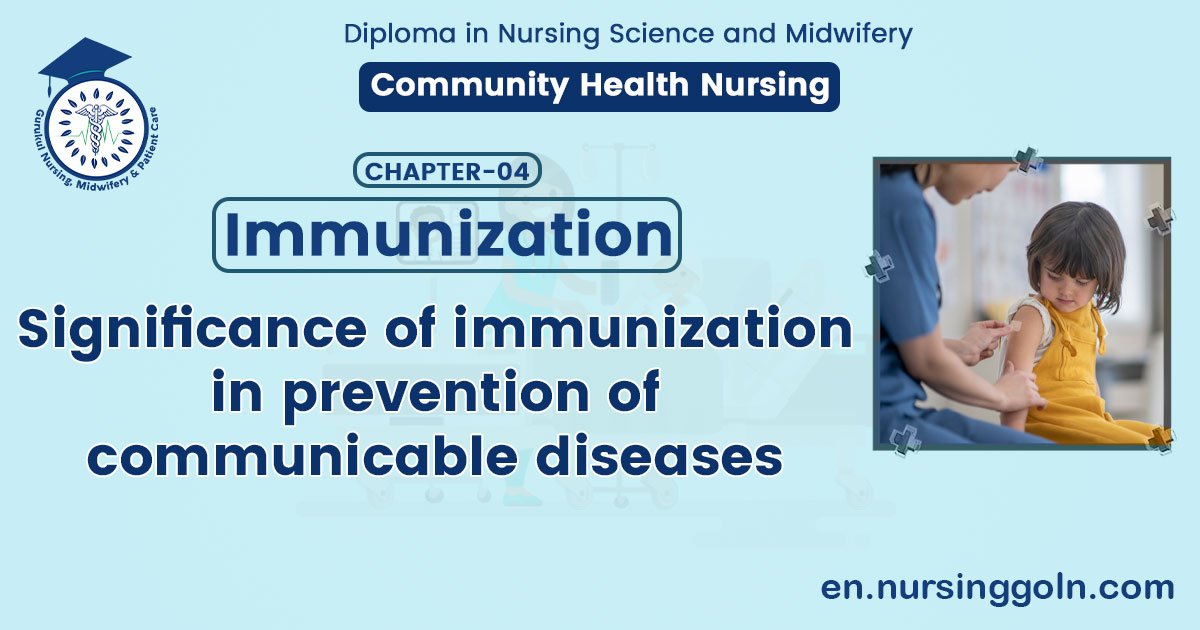Significance of immunization in prevention of communicable diseases – This book covers the entire syllabus of “Community Health Nursing” prescribed by the Universities of Bangladesh- for Basic and diploma nursing students. We tried to accommodate latest information and topics.
This book is examination friendly setup according to the teachers’ lectures and examination’s questions. At the end of the book previous university questions are given. We hope in touch with the book students’ knowledge will be upgraded and flourished. The unique way of presentation may make your reading of the book a pleasurable experience.
Significance of immunization in prevention of communicable diseases

Significance of immunization in prevention of communicable disease
For more than five decades, immunization has saved billions of lives. It is a very simple yet effective way to protect child’s health from a series of diseases and infections. In fact, immunizing not only provides protection from diseases but also lays a foundation for a healthy future. An overwhelming majority of parents, health, and medical professionals recommend immunization for the children.
Importance/Significance of immunization in prevention of communicable disease:
1. Immunisation saves lives. It protects family and community.
2. Immunisation helps protect future generations by eradicating diseases.
3. Many infectious diseases are rare or eradicated now as a result of immunisation programs, but new infectious diseases are appearing around the world.b
4. Vaccinations prevent child from getting diseases for which there are often no medical treatments. These illnesses can result in serious complications and even death.
5. A small number of people may be susceptible to diseases, such as those with impaired immune systems. These people may not be able to get vaccinations or may not develop immunity even after having been vaccinated. Their only protection against certain diseases is for others to get vaccinated so the illnesses are less common.
6. Getting immunized costs less than getting treated for the diseases that the shots protect from.
7. If exposure to a disease occurs in a community, there is little to no risk of an epidemic if people have been immunized.
8. immunization promote health: unlike many other health interventions, they help healthy people stay healthy, removing a major obstacle to human development.
9. It have an expansive reach.
10. It has rapid impact.
Or (Another Answer)
1. Prevents autoimmune disorders. Immunization enhances the ability of the immunity in the body. It is a self-mechanism. A stronger immunity relates to good health.
2. Not all children are born with a healthy immune system. Some are born with impaired immunity while others may fall prey to auto-immune conditions. Those people may not nurture good resistance even after vaccination. The only solution is immunization to brace against certain diseases.
3. Every parent wants their children to grow healthy and stay protected. Immunization prevents severe illness, and safeguard from the vaccine-preventable diseases. Some of the vaccine-preventable diseases include Hepatitis B, paralysis of limbs, amputation of legs or arms, brain damage, hearing loss, brain malfunction that when left untreated causes death.
4. Child’s immunity is fragile. They are prone to diseases, even for a mild change of weather or change in food habit. Immunization prevents spreading of diseases from one child to another.
5. Cost of immunization (vaccines) is far lower than treatment of the diseases itself.
6. Some of the infections may turn epidemic, affecting the whole community. Immunized people pose low to no risk of epidemic diseases.
7. Immunization is the only solution that eradicated Polio in infants. Booster vaccines and immunizations in the childhood secure the health.

8. Immunization prevents a number of complicated disorders. For instance, a pile of autoimmune disorders affects mankind. From diabetes to osteoarthritis, these diseases have no permanent cure. Developing a stronger immune system reduces the risk of auto-immune conditions.
9. Vaccination is safe and effective. All vaccines undergo long and careful review byscientists, doctors, and the federal government to make sure they are safe.
